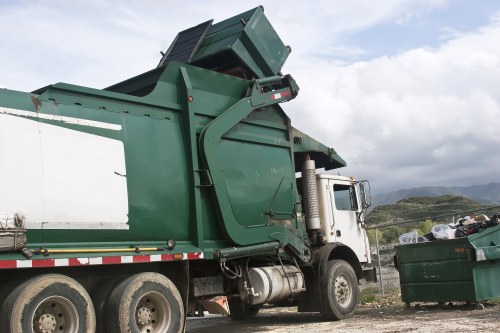Construction Waste Disposal in Sydenham

The Importance of Proper Waste Disposal
In Sydenham, construction projects generate a significant amount of waste. Proper construction waste disposal is essential not only for maintaining a clean environment but also for ensuring the safety and efficiency of ongoing and future projects. Effective waste management practices can lead to substantial benefits for both contractors and the community.
Improper disposal of construction waste can lead to environmental degradation, legal issues, and increased costs. By adopting responsible disposal methods, construction companies contribute to the sustainability of Sydenham, protecting its natural resources and enhancing the quality of life for its residents.
Moreover, effective waste disposal can streamline construction processes, reduce delays, and minimize the risk of accidents on-site. Understanding the various aspects of construction waste management is crucial for any construction project in Sydenham.

Types of Construction Waste
Concrete and Masonry
Concrete and masonry waste are common byproducts of construction activities. These materials, while heavy and bulky, can often be recycled or repurposed. Recycling concrete not only reduces the need for new raw materials but also decreases the overall environmental footprint of construction projects.
Wood and Metals
Wood and metal waste are prevalent in construction sites. Wood can be reused in various applications or processed into mulch, while metals like steel and aluminum are highly recyclable. Proper segregation of these materials is essential to facilitate their effective disposal and recycling.
Hazardous Materials
Construction sites may also produce hazardous waste, including asbestos, paint, and solvents. Handling and disposing of these materials require adherence to strict regulations to prevent environmental contamination and ensure the safety of workers and the community.

Waste Disposal Methods
Recycling and Reuse
Recycling and reusing construction waste is one of the most sustainable disposal methods available. By separating recyclable materials from general waste, construction companies can significantly reduce the volume of waste sent to landfills and contribute to the circular economy.
Landfilling
Landfilling remains a common method for disposing of construction waste, especially for materials that cannot be recycled or reused. However, it is essential to use licensed landfills that comply with environmental standards to minimize negative impacts.
Incineration
Incineration involves burning construction waste at high temperatures. While this method reduces the volume of waste, it can produce harmful emissions if not properly controlled. Therefore, it's crucial to utilize facilities with advanced emission control technologies.

Local Services in Sydenham
Licensed Disposal Companies
Sydenham boasts several licensed disposal companies that specialize in handling construction waste. These companies offer a range of services, including waste collection, transportation, and processing, ensuring that waste is managed in compliance with local regulations.
Renting Dumpsters
Renting dumpsters is a convenient option for construction projects of varying sizes. They provide a designated space for waste collection on-site, simplifying the disposal process and keeping the workspace organized.
Bulk Waste Collection
For large-scale construction projects, bulk waste collection services are essential. These services offer efficient and timely removal of substantial amounts of waste, preventing overcrowding and maintaining the project's momentum.

Best Practices for Construction Waste Management
Planning and Segregation
Effective waste management begins with meticulous planning. By assessing the types and quantities of waste expected, construction managers can implement segregation strategies that streamline the disposal process and enhance recycling efforts.
Minimizing Waste
Minimizing waste not only reduces disposal costs but also supports environmental sustainability. Strategies such as precise material estimation, efficient resource utilization, and adopting waste-reducing construction techniques are vital.
Collaboration with Waste Disposal Services
Collaborating with experienced waste disposal services ensures that waste is handled efficiently and responsibly. These partnerships facilitate adherence to regulations, optimize disposal processes, and promote sustainable practices.

Benefits of Proper Waste Disposal
Environmental Protection
Proper disposal of construction waste plays a critical role in protecting the environment. It prevents soil and water contamination, reduces greenhouse gas emissions, and conserves natural resources by promoting recycling and reuse.
Cost Savings
Effective waste management can lead to significant cost savings for construction projects. By reducing the volume of waste, companies can lower disposal fees and potentially generate revenue through the sale of recyclable materials.
Compliance and Avoiding Penalties
Adhering to waste disposal regulations helps construction companies avoid hefty fines and legal issues. Compliance ensures that projects proceed smoothly without interruptions caused by regulatory non-conformity.

Conclusion
Construction waste disposal in Sydenham is a critical aspect of sustainable construction practices. By understanding the types of waste, available disposal methods, and best management practices, construction companies can effectively minimize their environmental impact and enhance project efficiency.
Embracing responsible waste management not only benefits the environment but also offers economic advantages and ensures compliance with local regulations. As Sydenham continues to grow, the importance of effective construction waste disposal will only increase, making it imperative for all stakeholders to prioritize sustainable practices.
Ready to manage your construction waste responsibly? Contact us today to learn more about our services and how we can assist your next project in Sydenham.